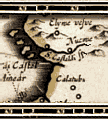
 ne disembarks for a few hours of leisure in Ashbury, while the crew takes on enough water and provisions to last a fortnight at sea; for a moment, the place appears to be a thriving port. The docks are busy from dusk to dawn, loading up trade vessels with crates, bags, and bales of every description, and unloading all manner of finished goods and sundries. Ships from all parts of the world rub shoulders and jostle for a billet at the pier, hoping to off-load their native cargo and return with a rich freight of the region's famed produce. One may see fat-bellied Caladonian barks and spice junks from Dernholm on either side of a hulking Tarantian steamer, or even an elegant merchantman from Black Root taking on a load of lumber. On the day we were there, the bay was mobbed even beyond the usual; the waters were alive with little boats of all kinds, from sailing skiffs to fishing trawlers to even tiny rowboats. Every vessel we saw was near-swamped with people, all struggling for room on deck to see a great sight: the twice-annual arrival of the elven ship Wind Weaver, a three-masted vision of loveliness which had come to fill its hold with the fruits of halfling farms and orchards.
ne disembarks for a few hours of leisure in Ashbury, while the crew takes on enough water and provisions to last a fortnight at sea; for a moment, the place appears to be a thriving port. The docks are busy from dusk to dawn, loading up trade vessels with crates, bags, and bales of every description, and unloading all manner of finished goods and sundries. Ships from all parts of the world rub shoulders and jostle for a billet at the pier, hoping to off-load their native cargo and return with a rich freight of the region's famed produce. One may see fat-bellied Caladonian barks and spice junks from Dernholm on either side of a hulking Tarantian steamer, or even an elegant merchantman from Black Root taking on a load of lumber. On the day we were there, the bay was mobbed even beyond the usual; the waters were alive with little boats of all kinds, from sailing skiffs to fishing trawlers to even tiny rowboats. Every vessel we saw was near-swamped with people, all struggling for room on deck to see a great sight: the twice-annual arrival of the elven ship Wind Weaver, a three-masted vision of loveliness which had come to fill its hold with the fruits of halfling farms and orchards.
 If one wades through the maddening crowd at the docks to explore, it is quickly apparent that Ashbury beyond the marketplace is a very different city; indeed, the place is hardly a city at all. On a casual stroll, one finds small shops, the occasional pleasant inn, and well-kept cottages set back from the street; a sleepy cat in the window and a halfling lady weeding her flower-bed are common sights. The place has history, but no ambition. Without the relentlessly capitalistic gnomes of the area driving always ahead, one must suppose that Ashbury would be just as content to be left quietly to itself…. For it is the gnomes who have financed the great Market, the new docks, and the rail lines which connect this quaint and lovely little place to the busy metropolis of Tarant; the people of Ashbury have had little say in the matter. It is simply their misfortune that their town is the only convenient point of embarkation for traders who wish to buy all the flour, fruit and hides of the Morbihan…
If one wades through the maddening crowd at the docks to explore, it is quickly apparent that Ashbury beyond the marketplace is a very different city; indeed, the place is hardly a city at all. On a casual stroll, one finds small shops, the occasional pleasant inn, and well-kept cottages set back from the street; a sleepy cat in the window and a halfling lady weeding her flower-bed are common sights. The place has history, but no ambition. Without the relentlessly capitalistic gnomes of the area driving always ahead, one must suppose that Ashbury would be just as content to be left quietly to itself…. For it is the gnomes who have financed the great Market, the new docks, and the rail lines which connect this quaint and lovely little place to the busy metropolis of Tarant; the people of Ashbury have had little say in the matter. It is simply their misfortune that their town is the only convenient point of embarkation for traders who wish to buy all the flour, fruit and hides of the Morbihan…















